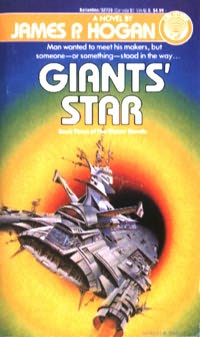Giants' Star
by James P Hogan

Reviewed by Coral
Having just missed the chance to tell the departing Giants that they were, in fact, headed to the new home of their people, the people of Earth did what they thought was the next best thing, they sent out a message to the distant Giants' Star, telling them of their comrades future arrival, knowing that, though it would be years before the message reached them, it would still beat the traveling ship by a few years. So imagine their surprise when they receive a response almost immediately!
Thanks to a sophisticated communications array these new Giants, the Thuriens, have been monitoring Earth, in fear that the destruction they unleashed upon Minerva would one day spread to the Galaxy, and the Thuriens themselves! But, with all their watching, how is it that these aliens have managed to miss the years of peace and demilitarization that the Earth has had? How is it that so much of what they believe to be the history of mankind is wrong?
The truth lies in Minerva's past and the bitter rivalry between the Cerians and the Lambians, a rivalry that exists to this day, despite the fact that no one on Earth even remembers it. But that won't stop the Lambians in their quest to be the ultimate victors.
Okay, so first off I have to apologize for the error I had in my previous review: there was an explanation given about how the 20 year/millions of years distortion came about. I guess I must have missed the part where he explained about their time based engine malfunctioning and causing the distortion.
So even though I didn't really like the first two books they still managed to keep my interest for the most part. Unfortunately, I had to really struggle to make it through this book. There was too much - to my mind unnecessary - political machinations. Also, there were a few really insulting aspects to this book.
Like, why does it seem like it's always the woman who gets seduced by the spy and unknowingly helps him get his hands on secret information and sabotage data streams? How come, just once, there's not one who's smart enough to go through the proper chain of command or, I don't know, ask "how?" or "why?"
And, I'm not sure I can explain it properly, but just simply dismissing early myths and religions as superstitious nonsense designed to keep mankind unenlightened. Now, I don't really understand religion myself, but I don't think it should be so easily dismissed. And about early mythologies being a hindrance to scientific learning? I don't see how you can label the science and thinking that came out of Ancient Greece, to name just one, backward.
Then there's this one part where we find out that all the bad guys are sexually loose and promiscuous. Like that's some big indicator of how bad they are and that it's the committed and married people who are the "good guys".
From years of watching sci-fi shows I've come to hate time travel on principal. The annoying paradoxes, the which came first, or how could this be when, all of it. So I hated the time travel aspect that was, needlessly, really, thrown at us in the last few chapters.
I really can't find one single positive thing to say about this book, except that it's over and, thankfully, so is my foray into this series as, for the moment, I don't have copies of books 4 and 5.
Grade: F